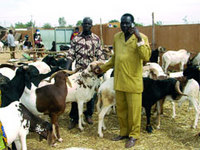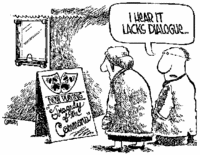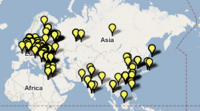 Regarding
Perry’s comment to the previous post,
the point is that the specific example on which Hardin based his thesis,
the one everyone cites in support of it, is not borne out by the evidence,
not that he presented any evidence for it in the first place.
Regarding
Perry’s comment to the previous post,
the point is that the specific example on which Hardin based his thesis,
the one everyone cites in support of it, is not borne out by the evidence,
not that he presented any evidence for it in the first place.
Further, that it’s not a tragedy in the sense Hardin meant: that of a Greek tragedy in which a flaw of character inevitably leads to the demise of the protagonist. Individuals are not inevitably disposed to claw out their own at the expense of everyone else. Sometimes people realize that there really is such a thing as the common good; that benefiting everyone benefits themselves.
Yes, I know about the Sahara and the Sahel; I’ve been there; I’ve seen the goats gnawing away at everything.
The solution is not state central planning: you cite Chinese lakes; I’ll cite the Aral Sea.
The solution is also not privatization of the commons: look at the wildfires in the U.S. west exacerbated by subdivisions built in forests.
Solutions that work seem to involve combinations of innovation, education, and especially cooperation. Like this one:
In the late 1970s, when the problems of desertification, combined with population growth, drought and grinding poverty in West Africa first began to get sustained global attention, the prognosis was mostly gloom and doom. And as has been well documented, foreign aid has been less than successful in improving matters. In Yahenga, Reij and Fabore note, efforts to modernize agriculture through large-scale mechanized operations usually failed, for a variety of reasons. The spread of zai hole planting spearheaded by Sawadogo was mostly carried out by the local farmers themselves, with limited support from the government or foreign donors. Those with access to labor dug the holes, and used local sources of organic manure to fill them.A tree grows in the Sahel, Andrew Leonard, How the World Works, Wednesday, Oct. 4, 2006 11:22 PDT
The “free market” isn’t enough. Cooperation on scales from local to global is also needed. And it does happen, despite Garrett Hardin’s myth that it can’t.
-jsq


